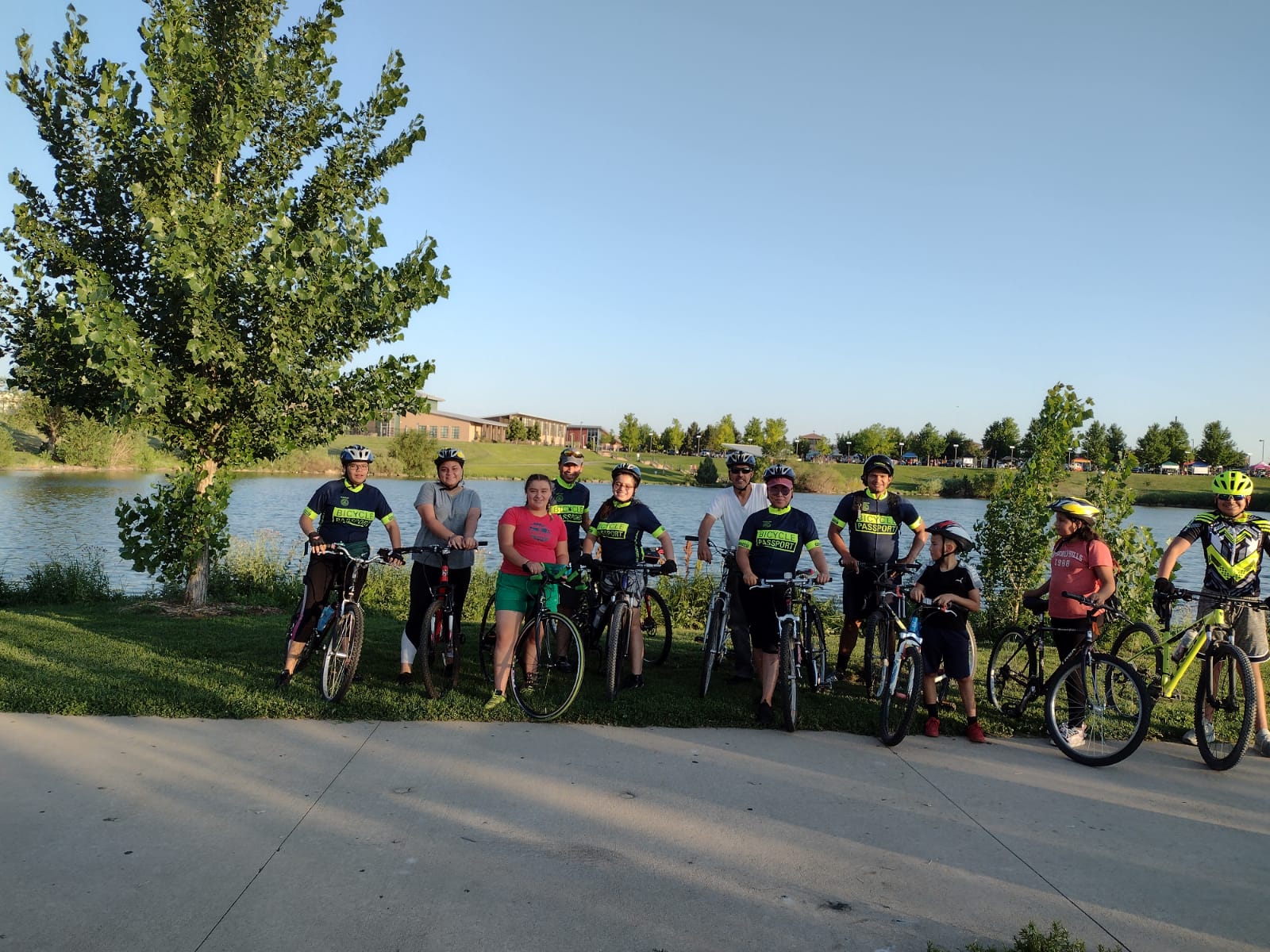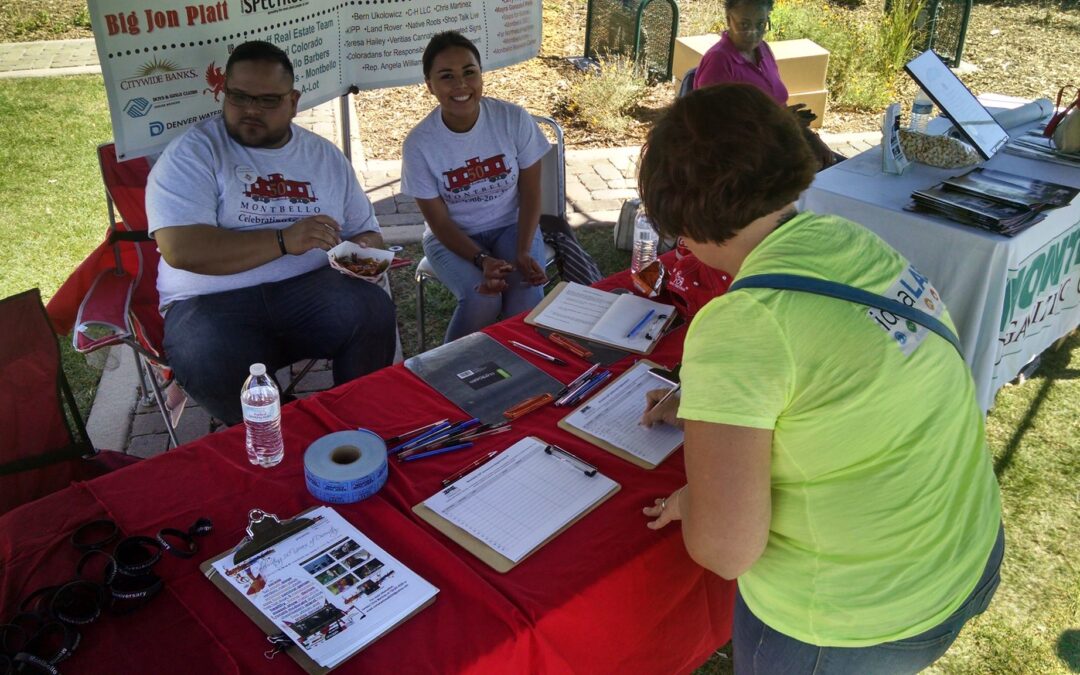As the Director of Community Development at the Montbello Organizing Committee, Mayra Gonzales leads innovative mobility, transit, and housing projects that center community empowerment, equitable community development, and social justice. Over the years, she has worked extensively to establish and nurture the Montbello neighborhood through the FreshLo Initiative, a vision for food access, equitable economic development, cultural arts, and affordable housing. We sat down with Mayra to hear about her experiences as a first-generation Mexican American who grew up in Montbello, the impacts she’s seen as a result of RTD reducing transit service in the area, and her goals for building youths’ capacity to take on transit advocacy work. Her story illustrates the importance of our mission to design communities that put people first.
DSP: What got you interested in active living and active transportation?
Gonzales: A lot of this has to do with my mom and her influence. She immigrated here from Mexico in the mid-80s, in her late teens. At the time, she lived near Sloan’s Lake with no access to a car, so she got to work and to relatives’ houses by bike. I grew up hearing these stories about her biking experiences around Denver. There was a gap when we lived in Mexico from 2003 to 2005. I had a bike myself to run errands and go to the butcher across town. Back then, it was a place you could walk and bike safely as a kid. When I returned to the US and came back to Montbello, I was like, “where is everything?” because I couldn’t get around independently anymore.
Later on as a teen, I joined a youth group with a nonprofit, located on 8th and Federal. We didn’t have a car, so my mom taught me how to take the bus to get there (back then, the bus fare was probably 75 cents). Because of her background with getting around the city, she was able to teach and share those experiences with me. Eventually, I became a college student and an avid commuter, getting familiar with the light rail system and navigating the city of Denver. That lived experience helped me work on my very first organizing project that focused on transportation issues.
RTD had decided to route the A Line around Montbello and, in doing so, they also cut what they thought was a duplicative bus service. We went from having seven linear transit routes throughout Montbello to only three. By speaking to riders and learning about the bus service that was eliminated, we realized that RTD had also eliminated access to the only grocery stores in the area for those who depended on transit. That same year, Montbello became a food desert. This fight became even more critical as it underscored the intertwined needs for both accessible public transit and access to essential food resources in our community.
I was so angry at RTD for what they were doing. I learned organizing skills from friends who were living in Westwood, who had just taken on RTD. They taught me how RTD functions as a quasi-governmental entity, when the board meetings were and how to prepare for testimony. But when we talked to RTD staff, we were treated like we didn’t know what we were talking about. So I went to school to learn the tools and technical language to advocate for our needs at these types of meetings. That’s why I got a master’s degree in Urban and Regional Planning.
DSP: What does community mean to you?
Gonzales: Community can be a geographic community like Montbello, or a cultural community like the Latino community, or a “home” like Mexico—so it can be very wide or narrow. There’s also the activist community in Denver, so identity groups and special-interest groups can be communities, too. Because of how intertwined my work and life is, my Montbello community is my biggest tie.
DSP: What would you say to people who identify needs in their community?
Gonzales: Collaboration has been the most important tool I’ve developed. Had I not done that, I wouldn’t have been able to advocate for our community and achieve wins like getting buses to the grocery store. A lot of it has to do with trust—sharing capacity, not hoarding information, having difficult conversations, and getting through those so we can collaborate in an authentic way.
What empowers you?
I have this vision that if my youngest niece ever got out of the house to go to the park, her experience would be a safe one. I want her to not have any fear that she’d get run over. I want her to be able to go to the park on her own.
DSP: What other organizations, people, and entities have been involved/a part of your work?
Gonzales: A lot of the people we work with live in Montbello and Green Valley Ranch. My favorite groups to work with are women, mothers, and immigrants, especially those who have been advocating at their children’s schools and taking advantage of leadership programs like the Colectiva Creando Cambios en Colorado (CCC) Promotora Trainings.
The FreshLo Initiative enabled us to create a partner network that is inclusive of local organizations and informal groups, churches, and schools. We work with organizations like Struggle of Love to address challenges with food access. Our food access work has allowed us to collaborate with the local schools to build community gardens and an urban farm. By working directly with community partners and resident leaders, and by ensuring my work is rooted in the community, we are able to challenge systemic inequalities—We’re changing old systems and creating new systems for our community to thrive in. We’re able to see the instant gratification of our work making a difference and creating a trusting network. For example, today I was able to pick up medicine for a neighbor who had brought over meals when I had COVID. It’s about the community taking care of the community.
DSP: You’ve shared some of your successes. What are some of the challenges you’ve faced?
Gonzales: Because Montbello has been historically divested, we’re prioritized in a lot of philanthropic funding, so big organizations flock here to get some of the funding that’s finally been made available to us. Working within a nonprofit, I am acutely aware of the nonprofit industrial complex, which often prioritizes funding over the core mission, stifling organizers’ abilities to work unencumbered. I’m determined to challenge this paradigm and emphasize the need for funders to enable, rather than constrain, community work. Beyond funders, I also call upon the City to move beyond the traditional model of seeking input and feedback and instead foster trust and empowerment among community partners—inviting them to the design tables and elevating them to decision-makers, rather than relegating them to mere approval committees. This shift is crucial for unshackling the potential of our collaborative efforts.
The history of Montbello’s development has been very car-centric. We’re fighting this car culture and trucker culture, where young people are getting into bigger and bigger trucks. When you’re living at home and not paying for household needs, you have discretionary income that goes into paying for these vehicles—so we’re losing a whole generation to this desire for truck ownership. We also have other folks who won’t let go of their cars because they’ve been indoctrinated into thinking that they need it for convenience. At the other end, we have the people who can’t afford cars and the people who can’t get licenses because of the school-to-prison pipeline and over-policing in our neighborhoods. These two groups have conflicting interests.
The biggest example is the bike lane installed on Andrews Drive, which is still controversial. After the bike lane was installed, some residents took to the news stations and social media to complain about the design and installation. As a result, there was a walking tour with the mayor, city council and DOTI staff. While none of the nay-sayers showed up, supporters did because, in that short time, they already felt safer. In fact, since the bike lane was installed, it has helped calm traffic. The park next to it, Silverman Park, is safer to get to since there isn’t this terror that people will be run over by vehicles traveling over 50 miles per hour. More families and kids are going to that park now, and it’s the park closest to this urban, dense living area. Now you see families walking to the park, not just driving there. It’s a massive improvement, but handling the backlash has been a challenging hill.

DSP: What’s next? What do you hope to accomplish?
Gonzales: I want to hype people up. Originally, I thought I was a convener, but now I think my role is to get the resources and tools needed to empower our younger folks. The kids come to our programming even though sometimes the parents don’t. So how can I better position myself to help the youth? We do a lot of meetings and programming that youth don’t always want to participate in, so we need to think of new ways to empower them and not tokenize or silence them. I’m trying to take myself out of the equation and create a supportive space for them to take ownership of the work they want to do.
Conclusion:
Mayra is community driven. She utilizes collaboration as a vessel for change, and we appreciate her dedication to creating supportive spaces for others to advocate for their community needs. If you want to learn more and support Mayra’s work on the FreshLo Initiative, please visit the Montbello Organizing Committee’s website.

